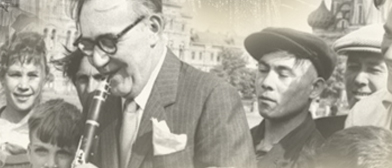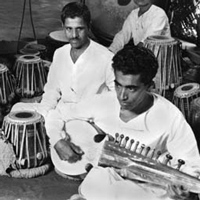
The Bharatiya Kala Kendra Orchestra performs for ‘The Duke.’ New Delhi, India, 1963
Ellington would have appreciated President John F. Kennedy’s praise for “the poet, the artist, the musician, [who continue] the quiet work of centuries, building bridges of experience between people, reminding man of the universality of his feeling and desires and despairs, and reminding him that the forces that unite are deeper than those that divide.”
Courtesy of the Duke Ellington Collection, Archives Center, National Museum of American History, Smithsonian Institution. |
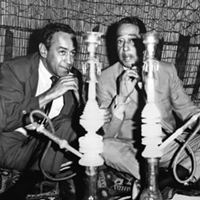
Ctesiphon, Iraq, 1963
The band’s opening night concert in Baghdad was broadcast by the country’s only television station. U.S. officials reported that “all over the city thousands sat around television sets in open-air cafes and restaurants or in the comfort of their own homes and enjoyed the artistry of one of the great contemporary figures in American music.”
Courtesy of the Duke Ellington Collection, Archives Center, National Museum of American History, Smithsonian Institution. |
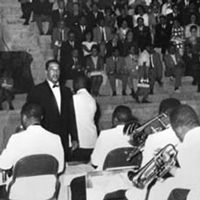
Performing for dignitaries and jazz fans at the Roman amphitheater. Amman, Jordan, 1963
Three thousand people, including the U.S. Ambassador and other high-ranking spectators, enjoyed Ellington’s music in this evocative setting. USIS officials and local event organizers promoted concerts along the band’s three-month travel route by wiring photographs and reviews to subsequent host communities. A critic in Ceylon, whose commentary on the Colombo concert was used to encourage ticket sales in Pakistan, lauded Ellington’s performance at the keyboard as “music to pepper the sky with . . . to tear open the clouds and carry before the wind.”
Courtesy of the Duke Ellington Collection, Archives Center, National Museum of American History, Smithsonian Institution.
|
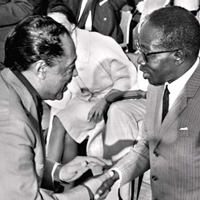
President Senghor congratulates ‘The Duke’ after his performance. Mrs. Senghor (with clasped hands) looks on with pleasure. Dakar, Senegal, 1966
The State Department was delighted to sponsor the musician’s visit to this unprecedented gathering of black artists from around the globe – hosted by the Senegalese poet-president. Duke composed La Plus Belle Africaine in honor of the festival and noted in his Dakar journal, “After writing African music for thirty-five years, here I am at last in Africa.”
Courtesy of the Duke Ellington and Ruth Ellington Collections, Archives Center, National Museum of American History, Smithsonian Institution. |
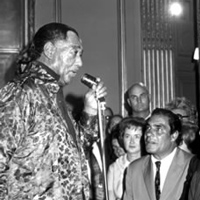
Buenos Aires, Argentina, 1971
The Duke undertook a State Department trip to Latin America shortly after his triumphant tour of the Soviet Union. Musing on his arduous travel schedule, Ellington explained that musicians are the only people in the world who do something fifty-two weeks a year without a holiday. “We never leave it. We breathe fresh air through music.”
Courtesy of Special Collections, University of Arkansas Libraries, Fayetteville. |
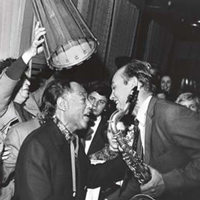
A spontaneous jam session during the tour. Soviet Union, 1971
Ellington and his orchestra encountered a vibrant – if still partially underground – jazz scene and played with Russian musicians in both official and unofficial capacities. The band leader’s Soviet tour followed the announcement of the upcoming and historic trip to the USSR by President Richard Nixon, a pianist
and avid jazz fan.
Courtesy of the Duke Ellington Collection, Archives Center, National Museum of American History, Smithsonian Institution. |
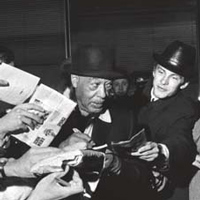
Soviet Union, 1971
One local fan called out to Ellington, “We have been waiting for you for centuries!” and jazz critic Leonard Feather characterized the tour as “the greatest coup in the history of musical diplomacy.”
Courtesy of the Duke Ellington Collection, Archives Center, National Museum of American History, Smithsonian Institution.
|
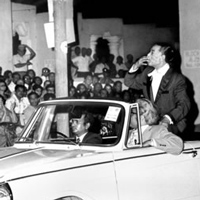
Colombo, Sri Lanka, 1972
Ellington first visited Ceylon during his 1963 State Department tour. Nine years later, adoring fans of this now independent nation were eager for another opportunity to hear the master in action.
Courtesy of Special Collections, University of Arkansas Libraries, Fayetteville. |
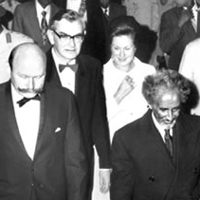
Emperor Haile Selassie enters the theater for the Command Performance. Addis Ababa, Ethiopia, 1973
The band leader embarked on what would be his final State Department tour just months before his death. Despite a battle with lung cancer and debilitating arthritis, the consummate Jazz Ambassador performed for the Emperor and dazzled officials with his diplomatic aplomb. Continuing a long-standing tradition of interaction with local artists, Ellington befriended the renowned jazz fusionist Mulatu Astatqé – jamming with him and other Ethiopian musicians.
Courtesy of Special Collections, University of Arkansas Libraries, Fayetteville. |
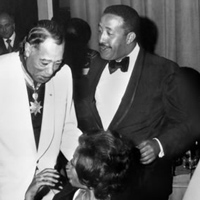
Gala dinner dance at the Addis Ababa Hilton. Duke Ellington wears a medal presented by Haile Selassie. Addis Ababa, Ethiopia, 1973
The band leader embarked on what would be his final State Department tour just months before his death. Despite a battle with lung cancer and debilitating arthritis, the consummate Jazz Ambassador performed for the Emperor and dazzled officials with his diplomatic aplomb. Continuing a long-standing tradition of interaction with local artists, Ellington befriended the renowned jazz fusionist Mulatu Astatqé – jamming with him and other Ethiopian musicians.
Courtesy of Special Collections, University of Arkansas Libraries, Fayetteville. |
The Keys to Diplomacy
Duke Ellington, the renowned composer, pianist, and internationally famed band leader, toured for the State Department more than any other musician. This began with his orchestra’s three-month swing through the Middle East and South Asia in 1963 and ended with performances in Eastern Europe, Ethiopia, and Zambia in 1973.
The first trip included Syria, Jordan, Afghanistan, India, Ceylon, Pakistan, Iran, Iraq, Lebanon, and Turkey. The Washington, DC native won over the public and diplomats alike with his warmth and charisma both on and off stage. Despite a grueling schedule of travel and performances, interrupted by periodic illnesses, Ellington delighted State Department officials who described him as “without fail gracious, articulate, charming, and absolutely winning,” and judged the band as “excellent ambassadors and representatives of America.” The Duke’s encounters with local musicians and unfamiliar musical forms influenced his composition and can be heard in his album Far East Suite. This tour was tragically cut short by the assassination of President Kennedy on November 22, 1963. In Turkey, Ellington sat up all night composing memorial music for the slain President, feeling strongly that continuing to perform was a better way to honor Kennedy than canceling concerts. The band was ultimately recalled to the U.S., but this trip proved to be just the beginning of Ellington’s far-reaching travels as a Jazz Ambassador.
There were State Department appearances in 1966 at the First World Festival of Negro Arts in Dakar, Senegal, and tours of Latin America and Asia in the early 1970s, but Ellington’s greatest diplomatic triumph came in 1971 when his orchestra toured the Soviet Union. This trip followed the announcement of President Richard Nixon’s impending visit to the USSR and promotional materials for Ellington playfully presented him as the front man for the President! The Ellington Orchestra played to ecstatic crowds in five cities. In Moscow, tickets were scalped for the then extraordinary sum of fifty dollars each as travelers descended on the city from distant points in the Soviet Union. With musicians and State Department personnel meeting surreptitiously at jazz clubs far into the night and even diving out of windows as the police arrived, jazz critic Leonard Feather called the tour “the greatest coup in the history of musical diplomacy.”
Subsequent to this trip and during the last three years of his life, Ellington’s activities for the State Department actually accelerated. The seventy-two-year-old Duke immediately followed the Soviet experience with performances in Eastern Europe and a tour of Latin America in late 1971. He visited Asia in 1972, including concerts in Vientiane, Laos, while the Vietnam War unfolded around them. In late 1973, he made his final State Department appearances in Zambia and Ethiopia, where he gave a command performance before Emperor Haile Selassie who presented him with a medal. Ellington became fast friends with the Ethiopian jazz fusionist Mulatu Astatqé as the two musicians brought their bands together to improvise with traditional Ethiopian and Western instruments. Already suffering from advanced lung cancer, but traveling nonetheless, Duke passed away the following spring.

